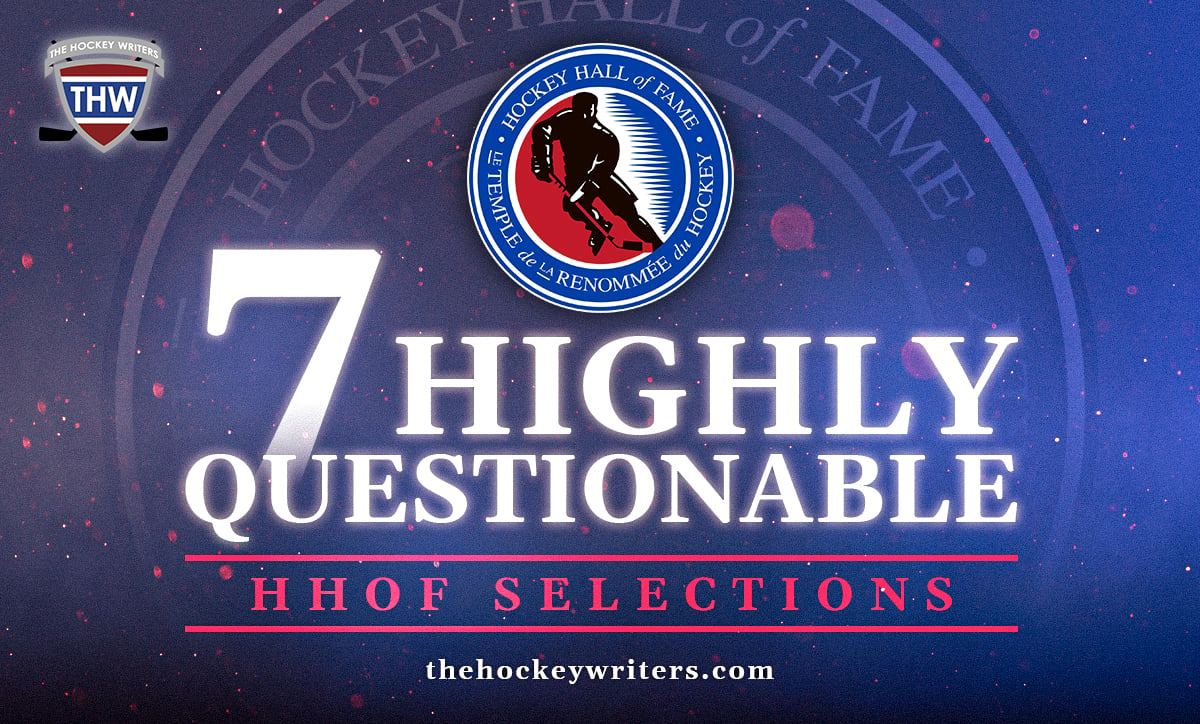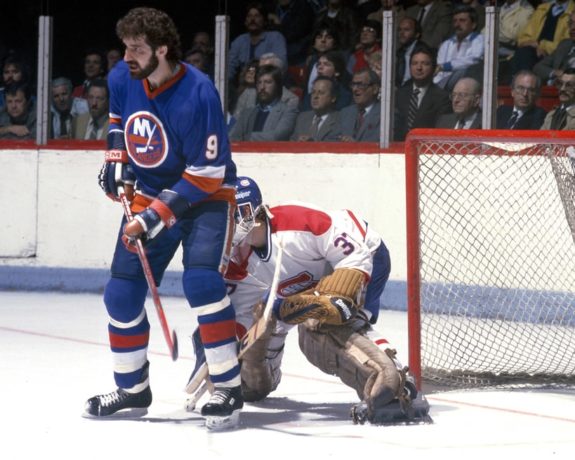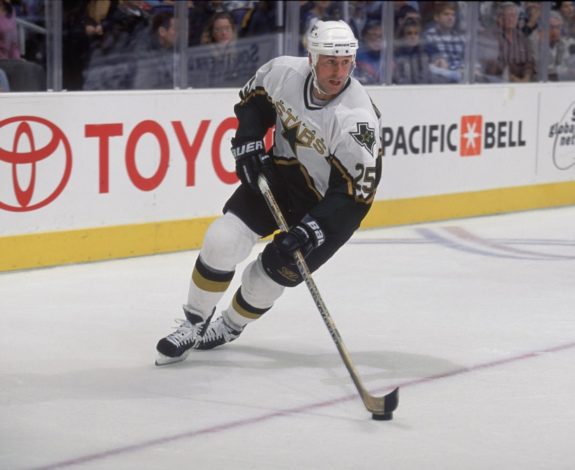Written by Bill Schoeninger in 2014.
Founded in 1943, the Hockey Hall of Fame has inducted 430 players, coaches, executives and officials for their tremendous contributions to the sport. While they all have left their mark on the game in various ways, some have accomplished more than others.
At times, the Hall of Fame committee has inducted some players that have sparked a lot of debate. Many believe they belong in the “Hall of Very Good” and not the Hall of Fame.

When looking at the most questionable choices, three trends shine through among those of questionable merit:
- Role players on dynasty teams.
- Forwards from the high-scoring 1980s and 1990s.
- An over-emphasis on physicality.
All seven of the following players fit into one of those categories, with most fitting in more than one. In my analysis, I’ll be making reference to a metric called VsX to evaluate scoring. It’s the best way to evaluate point totals across eras by comparing how much a player scored compared to the 2nd place scorer in the league that year. Here’s an example:
Related: A Thorough Explanation of the VsX System
Player A finishes 2nd in the NHL with 100 points. Player B scored 80 points that year, and is given a score of 80 (80/100).
I am not meaning to disparage these players, they were tremendous hockey players during their careers. It’s just that the Hall of Fame should be reserved for only the very elite players.
Dick Duff – Left Wing (1955-1971)
A member of both the Maple Leafs and Canadiens dynasties of the 1960s, Dick Duff collected six Stanley Cup championships during his career. A big part of his candidacy comes from scoring a few clutch goals in the playoffs, but he only led his team (not the playoffs) in goals, assists, or points in the playoffs once in his career.
Duff was known as a hard-working two-way player but never finished with a top 10 point finish, received no significant awards voting, and had a career high VsX of just 70.7. For a reference, Mike Ribeiro had five seasons of higher scores.
He was never the best player on his team, instead having the fortune of playing on some incredible squads. If he spent his entire career on mediocre teams, there is no chance he makes the Hall.
Gerry Cheevers – Goalie (1961-1980)
The goalie for the Big Bad Bruins of the 1970s, Gerry Cheevers played behind some unreal teams and the best defenseman in history. He backstopped the team to two Cups, but was far from the driving force behind the wins.
Despite playing behind one of the best teams ever, he never finished in the top five of GAA in any season when there were only ~15 teams (and 15 starters) in the league.
His highest finish in terms of post-season all-star voting was fifth when he received only six out of 486 votes. So, theoretically, he was a top-five goalie once in his whole career.
Related: The Best Nicknames in Hockey
He won some awards in the WHA, but his competition paled in comparison to the NHL where he was merely an above-average goalie. Had he played for the California Golden Seals, we wouldn’t be having this conversation.
Clark Gillies – Left Wing (1974-1988)
The left wing on the famed “Trio Grande” line with Mike Bossy and Bryan Trottier, Clark Gillies did the dirty work for the line. He was a big, physical power forward that was also a willing fighter.
Physicality is a valuable skill and helps his case, but when the rest of the picture isn’t there, it shouldn’t get him into the Hall.

Gillies had a great two-year peak when he finished 9th and 13th in points, but he finished in the top 60 in points just two more times in his career (30th and 48th). And he was on a line with two top 25 players of all time!
He never broke a VsX score of 80, and was at best the fifth-best player on those Islander teams. Compared to the regular season, his point-per-game average goes down from .73 to .57 in the playoffs. Being a power forward is great, but his offensives numbers are not HHoF caliber, despite playing alongside two legends.
Leo Boivin – Defense (1951-1970)
A stay-at-home defenseman, Leo Boivin’s claim to fame were his patented bone-crunching hits. Boivin was not large at 5-foot-8 183 pounds, but he could deliver thunderous body checks. Boivin played almost exclusively in an NHL that had six teams, yet Boivin’s teams made the playoffs in just 6 of those 15 seasons. Four teams made the playoffs each year.
Boivin did not have great individual success either, with his highest finish in post-season All-Star voting being seventh. Then consider that there were only 24 regular defensemen in the NHL, and you’ll understand the skepticism.
With a career-high of 26 points, Boivin’s accomplishments simply are not HHoF-worthy.
Glenn Anderson – Right Wing (1980-1986)
In Glenn Anderson, the list acquires its fourth role player from a dynasty. Anderson was a goalscoring wing who had talent, but whose point totals were inflated by playing on the highest-scoring team of all time in the highest-scoring era of all time.
He finished top three in All-Star voting just once, received no Hart Trophy votes, and was at best the sixth-best player on the Oilers behind Wayne Gretzky, Jari Kurri, Paul Coffey, Mark Messier, and Grant Fuhr. He broke a VsX score of 80 once, and had one top 10 point finish in his career. Despite being known for his playoff heroics, his Points per Game (PPG) actually goes down slightly from the regular season to playoffs.
Joe Nieuwendyk – Center (1986-2007)
The only center on the list, Joe Nieuwendyk was a very good player for a long time but never peaked high enough to be deserving of HHoF honors. He was a “compiler” who scored a good amount each season for a long time but was never actually an elite player.

His highest VsX score was 75.8 (Doug Weight beat that five times), and his highest finish in All-Star voting was fifth. In his career, he received just three total votes for the Hart Trophy over 20 seasons.
He gets a lot of mileage out of winning one Conn Smythe and three Cups, but his PPG in the playoffs is .17 lower than in the regular season.
Harry Watson – Left Wing (1941-1957)
A long-time Leaf, Watson is yet another example of a role player being recognized mostly because of his great teammates. Watson won five cups over his career, but was not the driving force for the victories.
He never received any significant All Star votes, and got two votes for the Hart Trophy in his entire career. He had one career year in which he had a VsX score of 83, but never broke 70 again. Remember, Mike Ribeiro’s done that five times.
Watson was a physical two-way player, which is definitely part of the picture, but his offensive abilities are too far behind for his intangibles to make up the ground. In the playoffs, he has a PPG that dips to .40 from .55 in the regular season.
What other HHoFers may not be worthy of the honors that have been bestowed upon them? Let me know in the comments.
